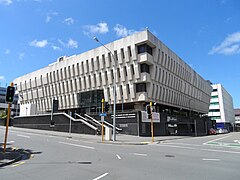National Library of New Zealand
 |
|
| Established | 1965 |
|---|---|
| Location | Molesworth Street, Thorndon, Wellington, New Zealand 41°16′36″S 174°46′42″E / 41.276614°S 174.778372°E |
| Branch of | Department of Internal Affairs |
| Branches | n/a |
| Collection | |
| Size | 1,515,172 in General Collections 5,333,500 in Alexander Turnbull Library |
| Other information | |
| Budget | NZ$31,850,000 (2006) |
| Director | Bill MacNaught (National Librarian) |
| Website | www |
The National Library of New Zealand (Māori: Te Puna Mātauranga o Aotearoa) is New Zealand's legal deposit library charged with the obligation to "enrich the cultural and economic life of New Zealand and its interchanges with other nations" (National Library of New Zealand (Te Puna Mātauranga) Act 2003). Under the Act, the library is also expected to be:
The library supports schools through its Services to Schools business unit, which has curriculum and advisory branches around New Zealand. The Legal Deposit Office is New Zealand's agency for ISBN and ISSN.
The library headquarters is close to the Parliament of New Zealand and the Court of Appeal on the corner of Aitken and Molesworth Streets, Wellington.
On 25 March 2010 the Minister of State Services announced that Archives New Zealand and the National Library of New Zealand would be merged into the Department of Internal Affairs.
The National Library of New Zealand was formed in 1965 when the Alexander Turnbull Library, the General Assembly Library, and the National Library Service were brought together by the National Library Act (1965). In 1980, the Archive of New Zealand Music was established at the suggestion of New Zealand composer Douglas Lilburn. In 1985, the General Assembly Library separated from the National Library and is now known as The Parliamentary Library. Staff and collections from 14 different sites around Wellington were centralised in a new National Library building, officially opened in August 1987. The architecture of the building is said to have been heavily influenced by design of the Boston City Hall., but direct reference to the Birmingham Central Library should not be ruled out.
...
Wikipedia
